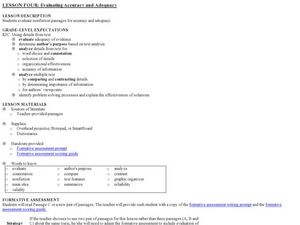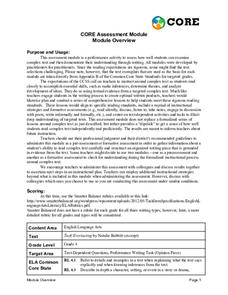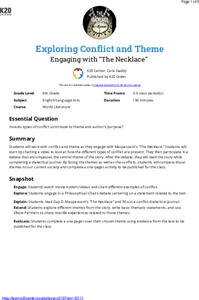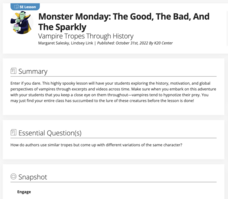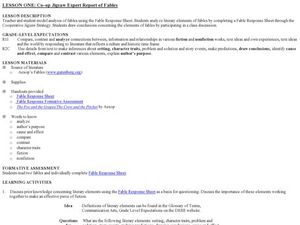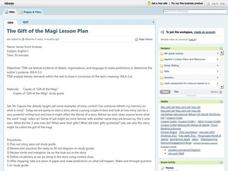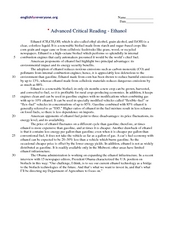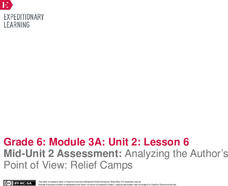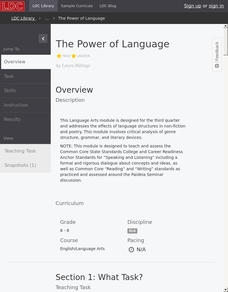Edmond Public Schools
SOAPSTone
Break an article down with a SOAPSTone chart. Class members determine the speaker, occasion, audience, purpose, subject, and tone. The chart includes a question for each of these elements, provides some clarifying text for each, and...
Curated OER
Evaluating Accuracy and Adequacy
Evaluate non-fiction works with your English class. While practicing a variety of strategies detailed in the plan, readers compare and contrast the information in three non-fiction passages about the same topic. They then discuss the...
California Education Partners
Tuck Everlasting
An assessment takes a close look at the story, Tuck Everlasting by Natalie Babbitt, and tests writing abilities. Over the course of two days, scholars read an excerpt, answer questions on a worksheet pertaining to the author's purpose...
Southern Nevada Regional Professional Development Program
Reading Literature - An Occurrence at Owl Creek Bridge
“An Occurrence at Owl Creek Bridge,” Ambrose Bierce’s short story, is used to model how structural moves, the decisions an author makes about setting, point of view, time order, etc., can be examined to reveal an author’s purpose. Groups...
National Endowment for the Humanities
The Argument of the Declaration of Independence
When in the course of a course on historic American events, it becomes necessary for learners to examine, with decent respect, the Declaration of Independence, it becomes evident that there are six separate and equal parts of that...
K20 LEARN
Exploring Conflict And Theme: Engaging With "The Necklace"
Teach young scholars how to determine the theme of a story, an insight the author wants to share with readers, with a lesson that uses Guy de Maupassant's "The Necklace" as an anchor text. Learners examine the internal and external...
Reed Novel Studies
Sounder: Novel Study
Only one character receives a name in William H. Armstrong's novel, Sounder—the dog! With the novel study, scholars explore the author's purpose in the unusual decision. They also write similes, answer comprehension and analysis...
Curated OER
"The Chase" Reading Questions
"The Chase," a chapter from Annie Dillard's autobiography, details an iceball project the narrator and her friends used to play. After your class reads the chapter, give them this reading assessment. Provided here are five short-answer...
National Math + Science Initative
Reading an Informational Text: "It All Started with Sputnik"
Sputnik was one of the greatest scientific advancements of the 1950s, and this reading lesson does it justice. Pupils start off with pre-reading questions and a video. They then read an excerpt from an article, which is accompanied by...
Curated OER
Predict, Draw Conclusions
Students discuss times they predict what will happen next. They compare this to using the information given in a piece of literature to predict what will happen next in the story. Students listen as the teacher reads an excerpt from The...
K20 LEARN
Monster Monday - The Good, the Bad, and the Sparkly: Vampire Tropes through History
Fangs, capes, pale skin, and beady eyes! High schoolers investigate the tropes associated with vampires by examining excerpts from stories and films. They then create a timeline that reveals how the depictions of vampires have evolved...
Mr. Ambrose
The Great Gatsby, F. Scott Fitzgerald
Good discussion questions, quizzes, and tests teach as well as assess. Readers of The Great Gatsby will learn much from the materials in a 36-page packet designed to help students prepare for the AP Literature exam. Included in the...
Curated OER
Authors on the Internet
Fifth graders write a list of their favorite authors and illustrators before deciding on ways to learn more about them. They examine print and Internet resources as a way to answer questions they have. They complete an Author Scavenger...
Curated OER
Cooperative Jigsaw Expert Report of Fables
Young scholars research literary elements of fables. In this literature lesson, students analyze literary elements of fables. Young scholars work collaboratively using a jigsaw strategy to analyze literary elements.
Curated OER
Dating - Characteristics and Purposes
Students discuss how they feel about dating. They assess physical attraction and the positives and negatives that are associated with dating. They determine the three purposes of dating and talk about dating etiquette and how to ask and...
Curated OER
The Gift of the Magi
Test the true meaning of giving - and irony - with this lesson about "The Gift of the Magi." Using textual analysis, details, and text organization, middle schoolers make predictions about future events in the story and determine the...
Curated OER
Advanced Critical Reading: Ethanol
In this advanced critical reading worksheet, students read a passage about ethanol then answer questions. Students make inferences, determine author's purpose and use context clues to find the meaning of unknown words in the passage.
EngageNY
Mid-Unit 2 Assessment: Analyzing the Author’s Point of View: Relief Camps
We're halfway there ... what a relief! Scholars read an excerpt from a primary source about the relief camps associated with the1906 San Francisco earthquake. Next, they complete a mid-unit assessment, answering short-answer and...
Library of Congress
Determining Point of View: Paul Revere and the Boston Massacre
If you're teaching point of view, this is the lesson for you! First, decipher the writer's point of view from a primary resource, then compare and contrast the primary source with a secondary source to explore the Paul Revere's engraving...
Florida Center for Reading Research
Comprehension: Text Analysis, Fiction and Nonfiction Find
Scholars analyze fiction and nonfiction text and fill in a worksheet detailing the text's title, genre, and reason for its classification.
Literacy Design Collaborative
The Power of Language
There is power in words. Readers take a close look at three text to determine how language structures affect meaning, including include poems and recipes. Scholars analyze the language authors use by circling important words, underlining...
Curated OER
Determining Importance
Students observe pieces of art and look for the principle story the artwork portrays. They compare the techniques artists and authors use to focus on and support these essential stories. They create a piece of art that portrays a given...
Curated OER
The Need to Evaluate
Students access 3 Internet sites. They examine the need to question information found on the Internet and research a question using the Internet. They study discrepancies among Web sites and brainstorm indicators that determine a Web...
Southern Nevada Regional Professional Development Program
The Columnist Project
Imagine a list that includes Alan Abelson of Baron's, Bob Woodward of the Washington Post, and Mother Jones. High schoolers select a national columnist, read and annotate five columns by this author, noting the rhetorical strategies,...



